


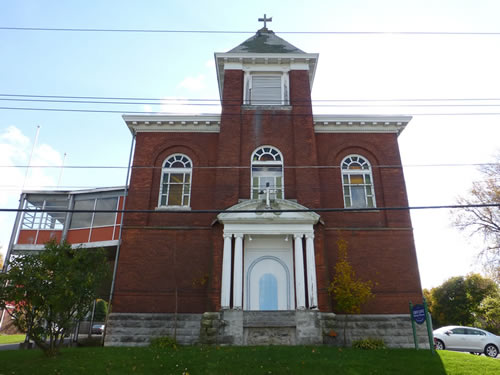

On June 16, 1901, Fr. John J. McGrath received a letter from Bp. Thomas J. Hickey (then a priest) asking him to locate a site in Northwest Auburn near Division and Van Anden Streets to establish a new parish. Two weeks later, on June 29th, Fr. McGrath left his position at St. Patrick's church in Moravia to embark on this endeavor. St. Alphonsus was incorporated on July 6, 1901.
The first parish convent was purchased on Gullfoyle Ave for $125. On Aug. 8, 1901, the Cochrane and Bachman properties were purchased on Van Anden St. for $6,000, and the buildings were raffled off. The Bachman lot would be used for constructing the church. D. W. Barnes and Son were hired as contractors, while stonework was completed by Mr. Daniel Bennett. Ground was broken on St. Aloysius church on Dec. 24, 1901. Prior to the church being completed, early Masses were celebrated at Arcade Hall in the O'Neill building on Clark St. beginning Oct. 31, 1901. Masses were offered at 8 and 10:30 AM each Sunday.
The cornerstone was laid on Mar. 30, 1902 by Bp. Hickey. Approximately 5,000 people attended this event. Later that year, on September 2nd, the St. Aloysius school opened its doors under the leadership of Sr. Mary Teresa. The initial enrollment for the school was 276 students. On Oct. 5, 1902, Bp. McQuaid officially dedicated the new church building. A second convent was eventually built on Wall St. for $1,200. The Rosary Society was born on Dec. 8, 1902, and the Holy Name Society on Dec. 13, 1902.
Construction of the Wall St. parish hall, which would be nicknamed "The Grand", began in July 1904 and was completed in 1906. On July 1, 1925, Fr. John Crowley took over the pastorate of St. Alphonsus. He served in this role for several years. At some point during his tenure, he received a letter reassigning him to St. Ann in Hornell, but he was permitted by Bp. Kearney to serve in his role until retirement at St. Aloysisus upon his personal request.
At some point, the parish acquired a new convent at 159 Van Anden St. for $3,500. The parish continued to serve the people of Auburn well for several years, but eventually church attendance and finances required that the parish share a Pastor with another parish. In 1982, St. Aloysius was clustered with nearby Holy Family church and began to share pastoral leadership under Conrad Sundholm, then a priest of the diocese. Several difficult decisions were made to keep the parish alive during this period of decline, including selling the rectory, convent, and parish hall.
The declines in attendance and revenue continued into the 1990s. By the mid-90s, there were approximately 110 registered families in the parish, and 161 total parishioners. Only one Mass was offered each weekend due to the small number of attendees. At that time, the parish was drawing off its savings and it was determined that it could survive until the end of 1995 or early 1996 at the latest. On Jan. 10, 1995, the parish council met to discuss the future of St. Aloysius parish. The council held a vote, and they decided to petition Bp. Matthew Clark to close down the church.
Bp. Clark accepted their request, and issued a decree of suppression and relegation on Apr. 12, 1995, effective June 27, 1995. The bishop celebrated the parish's final Mass on June 27th, assisted by two priests who formerly attended the parish. After the church was closed, the statue of St. Aloysius was moved into a shrine at the entrance of Holy Family church, which had been clustered with St. Aloysius since 1982 and where a number of former parishioners decided to attend. Other religious items were returned to the families who donated them, or found a home in other parishes. The former church building still exists, and it's presently occupied by "First Love Fellowship and Ministries."

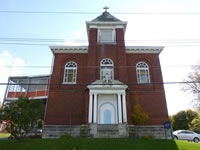
|
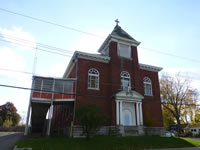
|
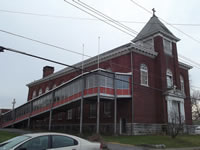
|
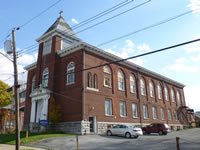
|
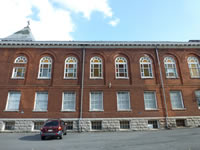
|
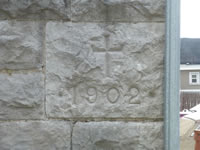
|

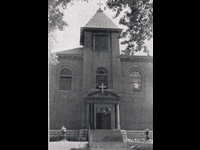
|
© 2008-2025 Rochester Churches. All photographs on this site listed under "External" or "Internal" photographs are property of Rochester Churches. Historical images are the property of their respective owners. This site is an independent project not affiliated with the Roman Catholic Diocese of Rochester. Rochester Churches is not for profit. The purpose of this site is to create an online catalogue of Rochester's Catholic churches, past and present.